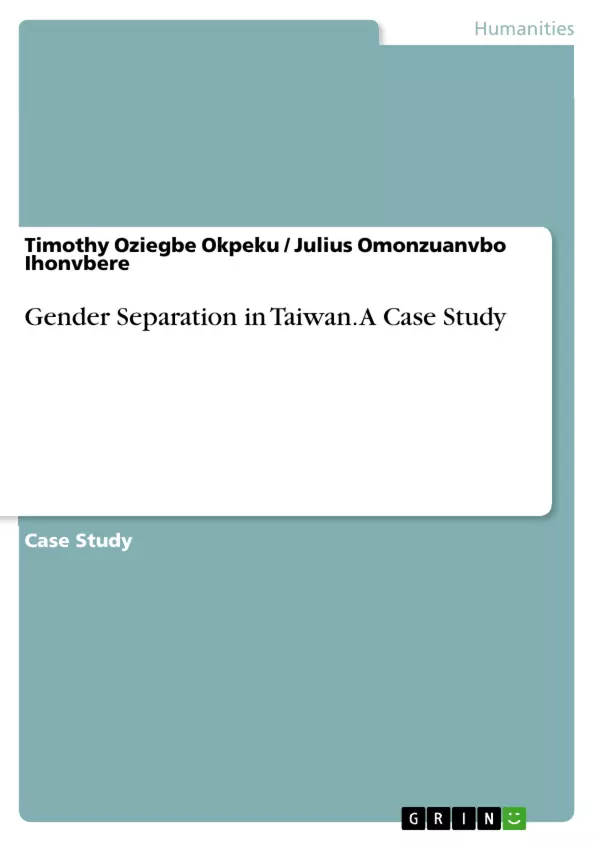In a bid to elucidate the extent of gender separation in Taiwan, this study was conducted to examine birds of a feather flock together, the case study of gender separation in Taiwan. The study research questions include: How do Taiwanese perceive gender separation in Taiwan? What role do Taiwanese culture and traditions play in gender separation in Taiwan?
Over the past decade, Taiwan's female labor force has increased twice as much as that of men, making the gender gap in labor forces smaller. In Taichung City, gender separation seems to be a notable way of association and social interaction in schools, workplaces, religious worship centers, and other social gatherings. This gender separation seems to be linked to the culture, social origin, traditions, and gender attractions of the Taiwanese. Junchao reported that gender separation had an impact on the ethnic groups of the local Taiwanese people, the impact was more on the males than the females. Reports show that socio-cultural and school-related features are the biggest factor that influences gender decisions in Taiwan. Xie, Deng, and Ma, reported that Chinese education and social behavior are influenced by gender.
Inhaltsverzeichnis (Table of Contents)
- Abstract
- Introduction
- Problem Statement
- Methodology
- Research Design
- Data Analysis
- Analysis Setting
- Participants Demographics Distribution
- Findings
- Managing Discrepancy
- Summary of Findings
- Discussion
- Recommendations
- Conclusion
- References
Zielsetzung und Themenschwerpunkte (Objectives and Key Themes)
This study aims to explore the prevalence and perception of gender separation in Taiwan. It uses qualitative research methods, including interviews and observations, to understand the experiences and perspectives of 15 Taiwanese residents in Taichung City. The study seeks to identify the root causes of gender separation and its impact on social interactions, relationships, and communication.
- Gender separation in Taiwan and its cultural underpinnings
- The role of culture, norms, values, and beliefs in perpetuating gender separation
- The impact of gender separation on social interactions in various settings, such as schools, workplaces, and religious centers
- The need for policies and initiatives to promote gender inclusivity and reduce the gender gap
Zusammenfassung der Kapitel (Chapter Summaries)
The introduction provides a background on the study, highlighting the influence of the COVID-19 pandemic on social interactions and gender inequalities. The problem statement outlines the research question, focusing on how Taiwanese perceive gender separation and its connection to cultural practices. The methodology section details the qualitative research design, including the data collection methods, participant demographics, and data analysis techniques.
The findings chapter presents a detailed analysis of the interview responses and observations. This section reveals the participants' perceptions of gender separation and its underlying factors, including gender difference, roles, responsibilities, and cultural influences. The discussion chapter synthesizes the findings and provides a nuanced understanding of the complex issue of gender separation in Taiwan. It also highlights the need for further research and intervention strategies to address the issue.
Schlüsselwörter (Keywords)
This study explores the phenomenon of gender separation in Taiwan, focusing on the cultural and social influences that contribute to its persistence. Key concepts include gender roles, social interaction, cultural values, beliefs, and traditions. The research examines the impact of gender separation on various aspects of life in Taiwan, including education, employment, and social gatherings. It emphasizes the importance of promoting gender inclusivity and reducing the gender gap through policy interventions and educational initiatives. The study's findings offer valuable insights for understanding and addressing the complexities of gender relations in a diverse and evolving society.
- Quote paper
- Dr. Timothy Oziegbe Okpeku (Author), Hon. Prof. Julius Omonzuanvbo Ihonvbere (Author), 2021, Gender Separation in Taiwan. A Case Study, Munich, GRIN Verlag, https://www.grin.com/document/1430190



